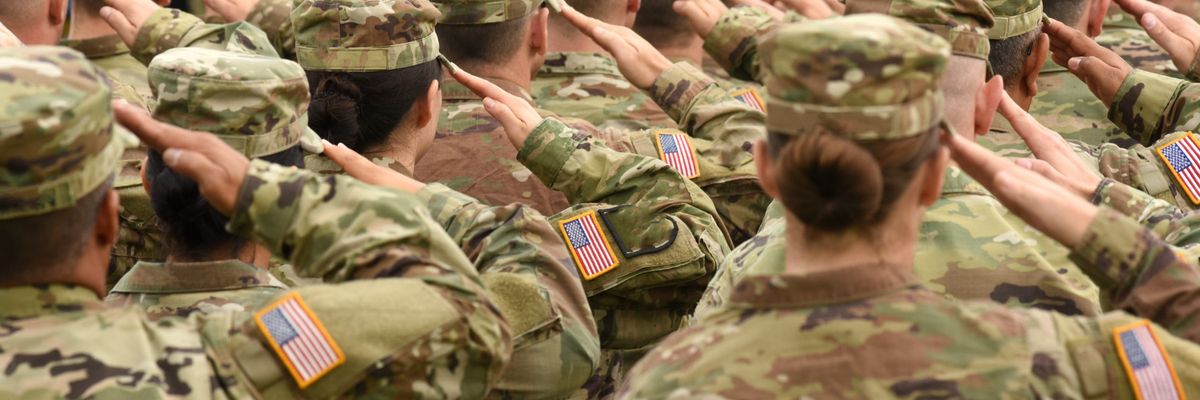The question over how "involved" the U.S. is in the Ukraine War is becoming increasingly rhetorical, as President Biden quietly signed an executive order on Thursday authorizing the call up of "the reserve and selected members of the individual ready reserve" for "the effective conduct of Operation Atlantic Resolve in and around the United States European Command’s area of responsibility."
The E.O. is brief and notes that no more than 3,000 reserves may be called up under the measure.
The question is, why? The military spin was on full display in Military.com yesterday: "This new designation benefits troops and families with increases in authorities, entitlements and access to the reserve component forces and personnel," said Lt. Gen. Douglas Sims, Joint Staff Director for Operations, who assured reporters the order would not result in higher U.S. troop levels in Europe.
The Pentagon's top spokesman Big. Gen. Pat Ryder put it more plainly: "It's unlocking additional forces for use in support of this operation."
After the invasion Washington increased its troop presence on the continent to 20,000. There were big headlines late last year when it was reported that members of the Army's 101st Airborne Division were "practicing for war with Russia just miles from the Ukraine border." We know from the Discord leaks there is a minimal number of U.S. Special Forces working with even more European military counterparts on the ground in Ukraine. There are at least 100 CIA officers on the ground there, too, according to reports, in non-combat roles.
A POLITICO article on yesterday's announcement gets right to the point: "the move suggests that the U.S. military’s training mission in Europe, along with the deployment of several new brigades after the invasion, has stretched active-duty forces."
Especially since NATO assured this week — as a consolation to Ukrainian President Zelensky, who wanted NATO member assurances — that the alliance would be upping its high readiness forces (ready to deploy in 30 days or less) to 300,000 strong. Right now the number of NATO troops on the continent is 100,000.
"It’s a tall order for the 31-member alliance whose individual members struggle with equipment and troop readiness after decades of skimping on military funding," said POLITICO writers Lara Seligman and Paul McLeary.
It's also a tall order for an American military that is struggling with the worst recruitment numbers in recent history. The Army experienced a shortfall of 25 percent in enlistments in the last fiscal year, and the other forces — Marines, Navy and Air Force — barely made their quotas. By all reports, it’s supposed to be worse this year.
Meanwhile, there are plenty of complaints that our European partners in "Operation Atlantic Resolve," are still not pulling their weight. As CATO's Justin Logan has charged many times, there is a dependency on the U.S. crutch and the war in Ukraine has more than encouraged that. At a time when it could be moving toward autonomy, Europe is hurtling faster into Uncle Sam's arms. From Logan:
It’s reasonable that our allies would like to use the U.S. economy and the U.S. military to their own ends. It’s unreasonable when American elites choose to indulge them. In multiple meetings with Biden administration officials after the war began, I was told that the United States would like Europe to do more for itself, but as one official put it, “we aren’t willing to put an ‘or else’ at the end of that sentence.”
Unfortunately, it now looks like Washington is stretching itself to accommodate, calling up reserves to meet a massive goal of 300,000 NATO troops on "high-readiness" ready to fight on the continent. Given the recruitment crisis and domestic needs at home, not to mention tensions with another great power in Asia, maybe it's time Biden take a moment to explain his strategy for ending this war, or short of that, asking directly for a greater commitment from the American people.
Update: Defense Priorities fellow and RS contributor Daniel Davis sent along these comments on the E.O.:
"If there's anything Russia has proven after 17 months of all-out warfare, is that the most they have been able to accomplish is to hang on to 17% of one neighboring state, 1/4th its size, which has no air force to speak of an no navy at all — and we believe we need to ramp up to a ground force of 300,000 "at a high state of readiness" to protect a 32 member alliance, with a population five times larger than Russia, an economy that dwarfs it, and an especially powerful and large air force and navy? I wholeheartedly agree with my colleague Raj Menon in today's New York Times: it's time for Europe to defend itself (based on reality of Western military and economic superiority, not on the fiction of a massive Russian conventional giant)."














